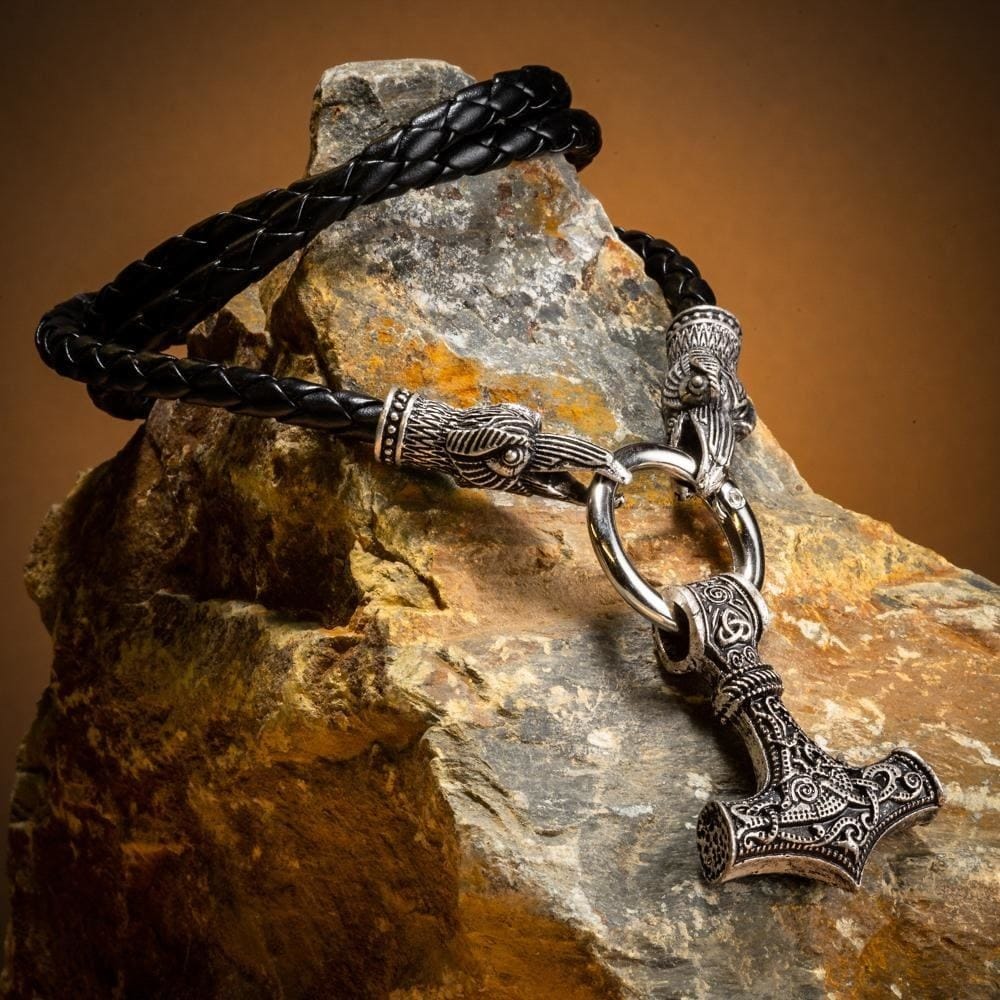3 Methods Of Viking Necklace Domination
페이지 정보

본문
The Viking necklace is a timeless piece of jewelry that represents a rich history and embodies the fierce and adventurous spirit of the Viking warriors. These necklaces have gained popularity over the years, not only for their exquisite craftsmanship but also for the captivating tales they tell. Let's delve deeper into the fascinating world of Viking necklaces.
Historical Significance
The Vikings were a seafaring people who inhabited the Scandinavian region from the late 8th to the 11th century. Renowned for their exploration, trade, and raiding expeditions, Vikings were known as skilled craftsmen who created intricate jewelry, including necklaces.
Viking necklaces were not just decorative items; they held great cultural and symbolic significance. These necklaces were often bestowed upon warriors who displayed exceptional bravery, Viking Necklace loyalty, or skill in battle. They were worn to express one's Viking identity and served as a status symbol within the society.
Design and Construction
Viking necklaces were crafted using various materials, including silver, gold, bronze, and bone. The choice of material depended on the wearer's social standing or personal preferences. The necklaces were typically adorned with intricate pendants, which featured designs inspired by Norse mythology, nature, or Viking symbols.
One common Viking symbol found in necklaces is the Mjölnir, also known as Thor's hammer. Mjölnir was considered a symbol of protection, strength, and fertility. Other popular symbols included ravens, wolves, dragons, and knots, each carrying its unique meaning. The level of detail and craftsmanship in these pendants is a testament to the mastery of Viking artisans.
Symbolism and Meanings
Viking necklaces were more than just adornments; they were thought to possess magical properties and were believed to offer protection and good fortune to the wearer. The runes, ancient Norse characters, were often inscribed on the pendants to infuse them with additional powers.
These necklaces symbolized the wearer's connection to the gods and their belief in the afterlife. Vikings had a deep-rooted belief in Valhalla, the great hall of Odin, where fallen warriors were brought after death. Wearing a Viking necklace was a way to honor their gods, pay tribute to their ancestors, and prepare for battle with bravery and pride.
Modern Revival
The popularity of Viking necklaces has resurged in recent years, as people have rediscovered the allure of Viking culture and Viking Necklace traditions. Modern-day jewelers have embraced the art of Viking necklace crafting, using traditional techniques to create both authentic reproductions and contemporary interpretations.
With their intricate designs and rich history, Viking necklaces have become a favorite accessory among those seeking to embrace the Viking spirit. These necklaces evoke a sense of adventure, courage, and strength, making them a popular choice for both men and women.
Whether worn as a statement piece or as a subtle nod to Viking heritage, the Viking necklace continues to capture the hearts and minds of people who appreciate its deep meaning and aesthetic appeal. Embracing the spirit of the Viking warrior, the necklace serves as a reminder of the indomitable human spirit and the power of myth and tradition that can withstand the test of time.
Historical Significance
The Vikings were a seafaring people who inhabited the Scandinavian region from the late 8th to the 11th century. Renowned for their exploration, trade, and raiding expeditions, Vikings were known as skilled craftsmen who created intricate jewelry, including necklaces.
Viking necklaces were not just decorative items; they held great cultural and symbolic significance. These necklaces were often bestowed upon warriors who displayed exceptional bravery, Viking Necklace loyalty, or skill in battle. They were worn to express one's Viking identity and served as a status symbol within the society.
Design and Construction
Viking necklaces were crafted using various materials, including silver, gold, bronze, and bone. The choice of material depended on the wearer's social standing or personal preferences. The necklaces were typically adorned with intricate pendants, which featured designs inspired by Norse mythology, nature, or Viking symbols.
One common Viking symbol found in necklaces is the Mjölnir, also known as Thor's hammer. Mjölnir was considered a symbol of protection, strength, and fertility. Other popular symbols included ravens, wolves, dragons, and knots, each carrying its unique meaning. The level of detail and craftsmanship in these pendants is a testament to the mastery of Viking artisans.
Symbolism and Meanings
Viking necklaces were more than just adornments; they were thought to possess magical properties and were believed to offer protection and good fortune to the wearer. The runes, ancient Norse characters, were often inscribed on the pendants to infuse them with additional powers.
These necklaces symbolized the wearer's connection to the gods and their belief in the afterlife. Vikings had a deep-rooted belief in Valhalla, the great hall of Odin, where fallen warriors were brought after death. Wearing a Viking necklace was a way to honor their gods, pay tribute to their ancestors, and prepare for battle with bravery and pride.
Modern Revival
The popularity of Viking necklaces has resurged in recent years, as people have rediscovered the allure of Viking culture and Viking Necklace traditions. Modern-day jewelers have embraced the art of Viking necklace crafting, using traditional techniques to create both authentic reproductions and contemporary interpretations.
With their intricate designs and rich history, Viking necklaces have become a favorite accessory among those seeking to embrace the Viking spirit. These necklaces evoke a sense of adventure, courage, and strength, making them a popular choice for both men and women.
Whether worn as a statement piece or as a subtle nod to Viking heritage, the Viking necklace continues to capture the hearts and minds of people who appreciate its deep meaning and aesthetic appeal. Embracing the spirit of the Viking warrior, the necklace serves as a reminder of the indomitable human spirit and the power of myth and tradition that can withstand the test of time.

- 이전글가임기 임신가능성 낙태..에관해.. 24.08.24
- 다음글What Everyone Should Find out about Learn More Plumbing Services Los Angeles 24.08.24
댓글목록
등록된 댓글이 없습니다.

